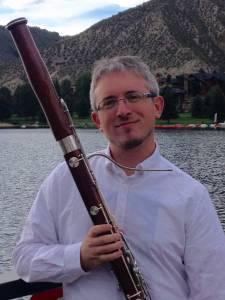The importance of performance, a personal journey.
When I just started playing the bassoon, the school I studied in had a requirement of playing a musical examination twice a year. I vividly remember how much I hated those occasions, how much I didn’t want to play bassoon for others. Looking back, I recognize that this reaction came at a stark contrast to how much excitement and enjoyment I gained from performing in singing roles with the choirs I sung with before I started learning bassoon. Of course, at the time I was not at all aware of this contrast, but in retrospect I can easily say that the biggest difference between those feelings was that of perceived competency: as a choir boy I always KNEW that I was very good at it, while as a bassoon player, I was around instrumentalists of the same age as me who have been playing for 2-4 years more than I, so I perceived myself as bad at it, which in turn made me ashamed to play for others.
Another thing I noticed and was able to recognize even at the time was that there was a big gap between the level of my playing when I was alone practicing, to when I played for my teacher in lessons, to when I performed for others, each subsequent step reducing the quality of the performance. With today’s perspective, I know that it was a matter of practice: just like any skill, in order to develop, one must exercise. Experts say it takes 10,000 hours of work to master a skill. In regards to music, often this is assumed to mean hours of practice. While practicing will help you become more proficient at your instrument, it is (usually) assumed that this instrumental proficiency will translate to the stage, and that is simply not the case. From hundreds (if not thousands) of performances and an international career as a musician, I can safely say that in order to get good at performances, one needs to practice performing.
But why should we? Why is performance such an integral part of a musician’s life? Sure, if one would make a career out of music, performance to an audience is the main way to generate income, but that is not really relevant to a 6-year-old child. For me personally, there are 2 answers to that question. The first has to do with confidence, social acceptance, and (perhaps most importantly), learning to deal with problems. The second answer is joy.
When I was young, I was the victim of bullying. While that stopped once I started middle school, the scars don’t really go away, and so I was something of a depressed, not confident, teenager. Through performing (I studied at a music middle/high school), I learned to develop stage presence, a presence which permeated my being and stuck with me beyond the boundaries of the concert hall. This newfound confidence translated into boosting my self-esteem, and in turn my social acceptance. The learning process of performance (again, I find this a completely different learning process and skill set than practicing the instrument) also taught me to quickly think on my feet, react, and roll with punches: every performer makes mistakes in their play. From the youngest novice to the most experienced professional, no one performs perfectly. No one. Ever. The question is, how do you react to mistakes? Do you let them ruin your day? Do you use them as a stepping stone to a musical/comedic development? Do you ignore them and move on? All those and nuances of them are strategies that one develops through performance. I found that, during my learning path, nothing has really prepared me to dealing with life’s hard turns (that everyone experiences in one way or another) as much as learning to overcome mistakes in performance, learning not to let something that didn’t work have a debilitating impact, and that, I think, is a hugely important life skill that performing can teach.
The second big reason for performance for me is that of joy. While it took a lot of work to get there, I can now honestly say that being on stage, performing in front of an audience, gives me huge amounts of joy. I now revel in performances, the bigger the audience, and the more exposed the part I have, the better. This has to do with an internal psychological shift I was able to make after countless performances in which I was nervous and afraid. It is a simple shift, but I can’t over emphasize how drastic it was for me. As a music student, I was taught that my “job” is to be as much as possible an accurate representation of the music on the page. To be a conduit from the composer to the listener. The internal shift I made was to a point of view that is opposite: it is the music’s job, the composer’s job to facilitate a representation of ME. This ties in to my confidence boost and stage presence. Suddenly music was about me, about what I want to say, about what I want to do, and about me connecting to the audience. Once I made that shift, and the validation to myself that the audience gave me (in the form of showing up, clapping, awarding me prizes and future opportunities), my sense of self worth increased, and I started gaining real joy from performances, and this joy is something I wish upon everyone in the world.
Credit: Daniel Nester has his doctoral degree in bassoon performance and pedagogy from the University of Colorado Boulder and is a bassoon instructor for the Colorado Music Institute.

